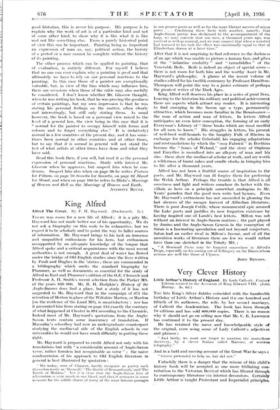King Alfred
Alfred The Great. By F. H. Hayward. (Duckworth. 2s.) Te cue. was room for a new life of Alfred ; it is a pity Mr. Hayward has not made better use of his opportunity. We do not ask a biography on this scale to be exhaustive, but we expect it to be scholarly and to point the way to fuller sources of information. Mr. Hayward brings to his task an immense and unqualified enthusiasm for his hero, but -enthusiasm unsupported by an adequate knowledge of the tongue that 'Alfred spoke and a critical acquaintance with the most recent authorities is not enough. A great deal of water has flowed under the bridge of Old English studies since the lives written by Pauli and Hughes in the 'sixties ; these are commended in a bibliography which omits the standard biography by Plummer, as well as documents so essential for the study of Alfred as Earl and Plummer's edition of the (&E.Chronick and Professor A. H. Smith's recent selection from the Parker MS. of the years 830-900. Mr. R. H. Hodgkin's History of the Anglo-Saxons does find a place, but a study of it has not suggested to Mr. Hayward that in the campaign of 871 the retention of Merton in place of the Wiltshire Marten, or Mardon fun the evidence of the Laud MS), is unsatisfactory ; nor has it prevented him from stating on page 112 exactly the contrary of what happened at Chester in 894 according to the Chronicle. Indeed most Of Mr. Hayward's quotations from the Anglo- Saxon texts contain some inaccuracy of translation. If Macaulay's schoolboy had now an undergraduate counterpart studying the mediaeval side of the English schools in our universities he would not have much difficulty in putting these eight.
Mr. Hayward is prepared to credit Alfred not only with his translations but with "a considerable amount of Anglo-Saxoa verse, rather formless but recognisable as verse" ; the naive condescension of his approach to Old English literature in general is best illustrated by quotation : " We today. sons of Chaucer, hardly recognise as poetry such rhymeleas works as • Beowolf," The Batt le of Brunanburgli,' and 'The Battle of Maldott.' Yet it is clear that the Anglo-Saxon love of alliteration is very much in our blood, and duet it accounts in some measure for the subtle charm of many of the most famous passages in our greater poets as well as for the more blatant success of minor poets . . . Combining these facts with another, namely, that Anglo-Saxon poetry was declaimed to the accompaniment of the harp, we may concede that our race, a thousand years ago, was poetical as well as musical, and we may suspect that when a minstrel had warmed to his task the effect was emotionally equal to that of Elizabethan drama at a later time."
After that it is not surprising to find reference to the darkness of an age which was unable to picture a human face, and gibes at the " infantine credulity" and " tarradiddles " of the Venerable Bede. Bede is indeed an object of special scorn— there is not room for both him and the worthy Asset- in Mr. Hayward's philosophy. A glance at the recent volume of studies edited for his twelfth centenary by Professor Hamilton- Thompson will point the way to a juster estimate of perhaps the greatest writer of the Dark Ages.
King Alfred well deserves his place in a series of great lives. Leaving to the historian his military and political achievement there are aspects which attract any reader. It is interesting to find emerging in the Saxon age a type, permanently attractive, which becomes more familiar in the Renaissance— the man of action and man of letters. In letters Alfred anticipates an even later conception, the forming of an early Everyman's Library of "those books which are most needful for all men to know." His struggles in letters, his present of well-bred wolf-hounds to the haughty Fulk of Rheims in exchange for the scholar Grirnbald, his engaging adaptations and mistran.slations by which the "ossa Fabricii " in Boethius become the "bones of Weland," and the story of Orpheus and Eurydice is moralised into an allegory of man and his sins—these show the mediaeval scholar at work, and are worth a wilderness of burnt cakes and candle clocks in bringing him to life after a thousand years.
Alfred has not been a fruitful source of inspiration to the poets, and Mr. Hayward can ill forgive them for preferring the Welsh Arthur. Perhaps the trouble is that Alfred is all sweetness and light and writers somehow do better with the villain as hero on a principle somewhat analagous to Mr. Yeats' paradox that the good men write bad hymns. Even Mr. Hayward's enthusiasm has not succeeded in gleaning the last sheaves of the meagre harvest of Alfredian literature. There is poor Joseph Cottle, whose monumental -epic amused the Lake poets and justifies its now forgotten existence by having inspired one of Lamb's best letters. Milton was not without an interest in Anglo-Saxon matters ; the part played by Junius and the Anglo-Saxon -Genesis in the conception of Satan is a fascinating speculation and not beyond conjecture. Satan had an earlier rival in Milton's favour, and of all the unwritten works of literature there are few we would rather have than one sketched in the Trinity MS.: - "A Heroicall P03111 may be founded somewhere in Alfred's
• Reign, especially on his issuing out of Edlingsey on the Danes,whose actions are well like those of Ulysses.
JOHN BRYSON. '










































 Previous page
Previous page